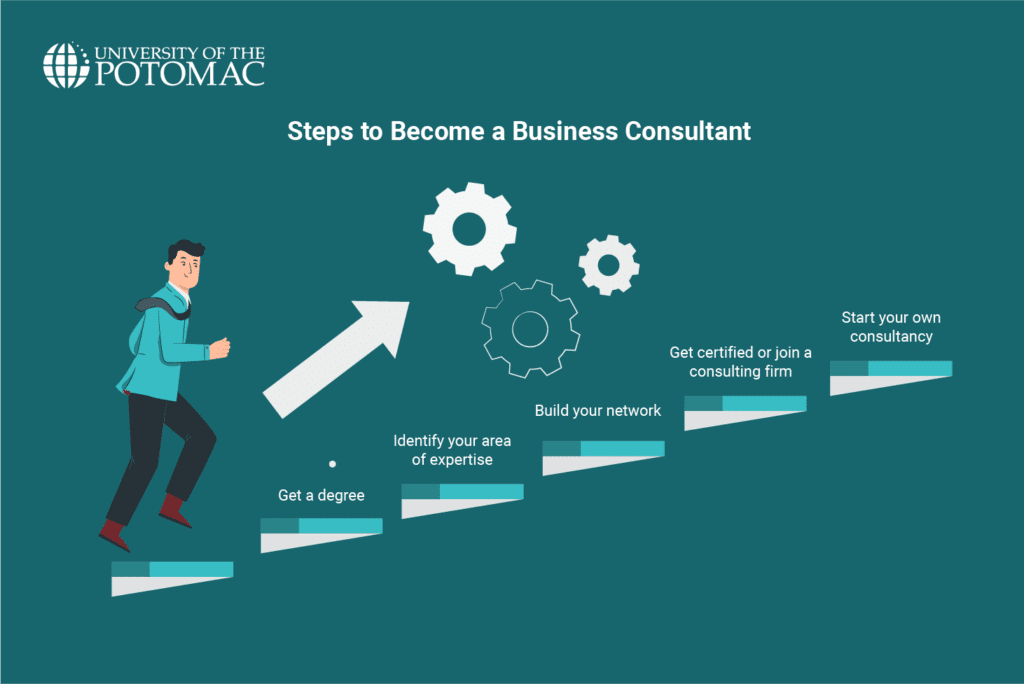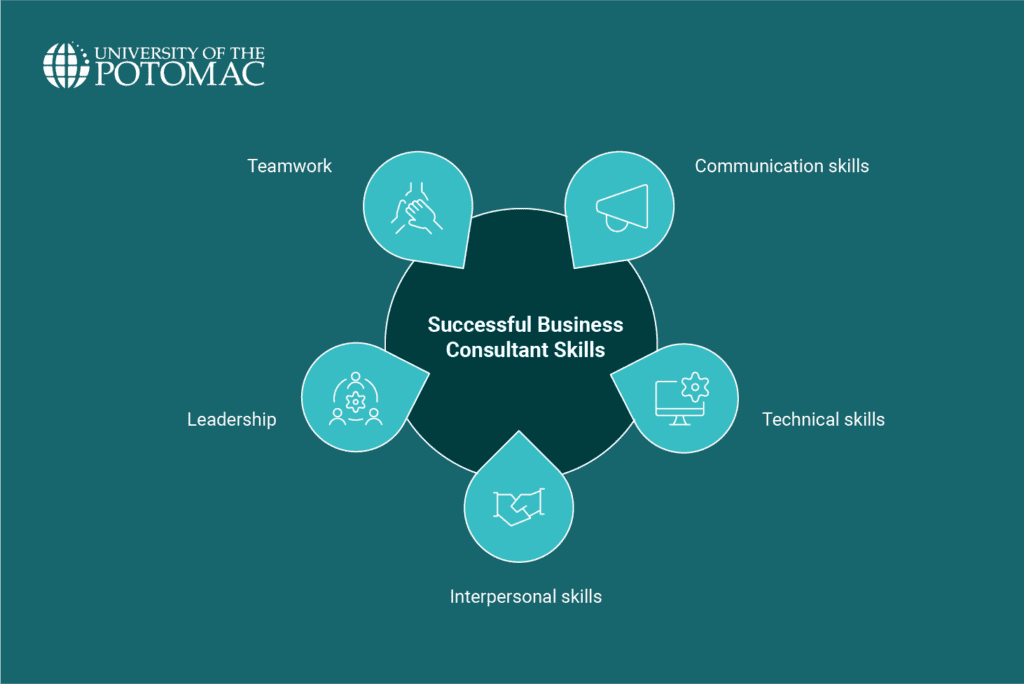Key Takeaways
- Business consultants help companies solve problems, improve efficiency, and grow by analyzing how the business works and suggesting solutions.
- Focusing on areas like marketing, finance, or operations can help you stand out and attract better opportunities as a business consultant.
- Building a strong network is very important for business consultants because it helps them get referrals, find clients, and stay updated on the latest industry trends.
- Business consultants earn good salaries; the average wage is about $92,000, and the job market is growing by 11% through 2032.
If you want to help businesses grow, become more productive, and overcome challenges, a career as a business consultant may be perfect for you. Business consultants offer guidance to companies looking to enhance operations and manage shifts in their industries. Various industries, such as marketing, technology, healthcare, and finance, are always searching for consultants to assist them in optimizing their strategies and processes.
In this guide, we’ll outline the key steps to becoming a business consultant, covering everything from obtaining the right education to gaining experience and finding your specialized area of expertise.
What Does a Business Consultant Do?
A business consultant helps organizations solve problems, improve operations, and achieve their goals. They start by looking at the company’s management, finances, and processes to determine which areas need improvement. After that, they create plans to deal with specific problems or boost the business’s productivity.
Business consultants also work closely with their customers to put these ideas into practice and ensure that the improvements are long-lasting and successful. They can offer support, track advancement, and provide training to help the business succeed.
Steps to Become a Business Consultant

In order to become a business consultant, first get a degree in business or a similar discipline and then pick a specialty such as operations, marketing, or finance.
For success in this field, you must develop a professional network, get experience by working in a consulting firm or earning credentials, and even launch your own company. Each step plays a critical role in building a successful consulting career.
Get a degree
Business consultants with formal education are preferred by most customers and companies since it gives them the necessary business, problem-solving, and planning skills. To offer effective solutions, you need to have a solid understanding of basic concepts like financial analysis, organizational structure, and market trends.
Aspiring business consultants can pursue bachelor’s degrees in management, business administration, economics, finance, or marketing, depending on their interests. Getting a business degree not only helps you acquire the skills you need but also makes you more competitive and reputable in the consulting field.
Identify your area of expertise
Choosing a specific area of expertise is necessary to stand out in the competitive consulting industry. By concentrating on a particular field, you can provide unique skills that are more sought after and could lead to higher-paying positions. You can pick the ideal field by studying market trends and learning what clients are looking for.
Business consultants often specialize in operations and supply chain management, financial analysis and budgeting, and marketing and sales strategies. Specializing in one of these areas can help you attract clients who need your specific skills, improving your chances for success.
Build your network
Building a strong network is very important for business consultants because it helps them get referrals, find clients, and stay updated on the latest industry trends. Many consulting opportunities come through personal connections, not just job postings, so networking plays a big role in growing your business. To start networking effectively, attend events where you can meet other professionals and potential clients. When introducing yourself, confidently and clearly explain the services you offer.
Participating in online discussions, like those on LinkedIn or business forums, can help boost your visibility and reputation by offering valuable insights. Lastly, follow up with a brief email or LinkedIn message to new connections to maintain the relationship and express interest in future collaboration.
Get certified or join a consulting firm
Business consultants, especially those who work alone, can show their skills and build trust by obtaining certifications. These credentials show clients that you possess the necessary skills and knowledge for the job, making it easier to earn their trust and differentiate yourself from competitors.
Notable certifications for business consultants include the Certified Management Consultant (CMC), Project Management Professional (PMP), and Lean Six Sigma. These certifications are highly regarded and can increase client confidence in your skills.
Alternatively, working for a consulting firm can provide valuable experience, expose you to a range of clients and projects, and help you expand your professional network, which may open doors for future independent consulting opportunities.
Start your own consultancy (optional)
Establishing your own consultancy might be a great option if you have a lot of experience, a strong network, and a clear idea of what you want to focus on. This is ideal for those who believe in their skills and are ready to assume the responsibility of running their own business.
The first step is to create a business plan that explains what services you will offer, who your target audience is, and how much money you want to make. This plan helps you stay focused and organized.
After that, you’ll need to register your business and decide on the legal structure, like an LLC or sole proprietorship, depending on what works best for you.
Last but not least, having the right tools in place—such as a website, brand identity, and client management systems—is essential to running a successful business and attracting new customers. By following these steps, you can build your own successful consulting business.
Skills Needed to Be a Successful Business Consultant

To succeed as a business consultant, there are several important skills that help you work effectively with clients and deliver valuable solutions.
Interested in pursuing a degree?
Fill out the form and get all admission information you need regarding your chosen program.
This will only take a moment.
Message Received!
Thank you for reaching out to us. We will review your message and get right back to you within 24 hours.
If there is an urgent matter and you need to speak to someone immediately you can call at the following phone number:
- We value your privacy.
- Communication skills. Clear communication is essential for explaining ideas, presenting solutions, and making sure everyone understands the plan. Business consultants need to listen carefully to clients and communicate their thoughts in a simple, understandable way.
- Technical skills. Being comfortable with data analysis, financial modeling, and using relevant software tools helps consultants make informed decisions. Technical skills allow consultants to assess situations and develop practical solutions based on data.
- Interpersonal skills. Crucial for building strong relationships with clients, these skills help consultants understand clients’ needs, build trust, and work well with different people in the organization.
- Leadership. Business consultants often lead teams or projects, guiding them toward achieving goals. Strong leadership helps consultants keep the team focused, motivated, and on track, ensuring the best results for clients.
- Teamwork. Even though consultants may work independently, they must be able to work well with others to achieve the most effective solutions. Being a good team player ensures smoother interactions and better outcomes for clients.
Business Consultant Salary and Job Outlook
The salary for business consultants depends on factors like experience, industry, and location. The average salary for a business consultant in the U.S. is about $87,214 per year. However, entry-level consultants typically earn around $64,000, while experienced professionals, especially those with expertise in specialized fields, can earn more than $117,000 annually.
The job outlook for business consultants is strong. As businesses are constantly looking for expert advice to solve complex problems and improve operations, this profession is expected to grow by 11% in the next decade, faster than most other jobs. There is especially high demand for consultants in the technology, healthcare, and finance industries. As these sectors continue to grow and change, the need for skilled consultants remains strong, providing good career opportunities.
Is a Career in Business Management the Right Path for You?
A career in business management consulting can be a great choice if you enjoy working in fast-paced environments and like solving different types of problems. If you find satisfaction in working with various teams or clients to come up with solutions, this career could be a good fit.
However, it’s important to understand that consulting can also be very demanding. Consultants often work under pressure, face tight deadlines, and are responsible for delivering results that affect their clients’ success. Managing multiple projects at the same time can make it hard to maintain a healthy work-life balance.
Before deciding if this career is right for you, think about whether you are comfortable working in stressful situations, handling many tasks at once, and quickly adjusting to new challenges. If these things sound like something you would enjoy, business management consulting might be the right career for you.
Wrapping Up
Becoming a business consultant involves several important steps, including getting the right degree, identifying your area of expertise, building a strong network, and obtaining certifications or experience through a consulting firm. Business consultants enjoy a competitive salary and a positive job outlook. Industries like technology, healthcare, and finance continue to drive demand for consultants, ensuring strong opportunities in the field.
Explore POTOMAC’s Bachelor of Science in Business program to gain the knowledge and skills you need to succeed in this dynamic and rewarding career.
Frequently Asked Questions (FAQs)
How long does it take to become a successful business consultant?
Becoming a successful business consultant typically takes several years of experience, including obtaining a relevant degree and gaining expertise in a specific industry.
What is the difference between a business consultant and a management consultant?
A business consultant focuses on improving overall business operations, while a management consultant specifically advises on organizational structure, strategy, and leadership.
Can you become a business consultant without a degree?
While it’s possible to become a business consultant without a degree, most employers and clients prefer consultants with formal education, as it provides foundational knowledge in business principles.










